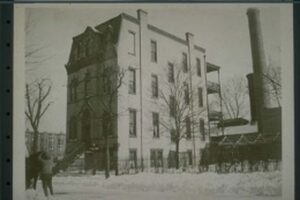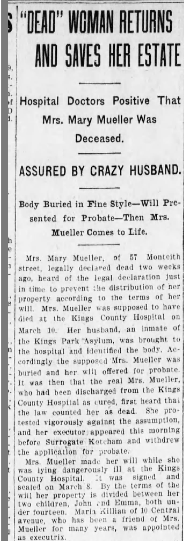 German Evangelical Home in 1925. Eugene L. Armbruster photographs and scrapbooks, v1974.001, courtesy of the Brooklyn Historical Society.
German Evangelical Home in 1925. Eugene L. Armbruster photographs and scrapbooks, v1974.001, courtesy of the Brooklyn Historical Society.
My grandmother, Emma Mueller, never really knew her father. Her mother, Marica Michelic Muhvic, a widow – born in Stari-Tsg, Slovenia, part of the Austro-Hungarian Empire, in 1873 – had emigrated alone to New York in 1903 to seek a better life.[1] Marica changed her name to Mary and found a job working as a housekeeper in the German Evangelical Home for the Aged in Brooklyn, New York, where she was living in 1905.[2] Here she could interact with people that made her feel like she was in her home country, since they shared a common language and culture.
A fellow Austro-Hungarian immigrant named Emil Mueller was also residing at the Home for the Aged at that time. He was a recent widower, sixty-six years old and retired, with no local family. Emil’s occupation was that of a chef and baker, working in resorts across neighboring states, and he resided in the resorts’ boarding houses during his employment. Mary Muhvic, the housekeeper, and Emil Mueller, the retired baker, met and married in 1906, at the home’s chapel.[3]
Given that the Muellers rented their home, they did not create a large paper trail.
Given that the Muellers rented their home, they did not create a large paper trail. The only records in which they appeared together were their marriage record in 1906, the birth records for their children, Emma and John, and the 1910 census in Brooklyn.[4] I decided to see if any mentions of Emil or Mary could be found in local newspapers during that time. What I found revealed a shocking and tragic story of my immigrant ancestors, who had no family relations in their new country to help them during times of severe illness.
The article tells the story of two very sick women, who had similar names and ages and were patients of Kings County Hospital in Brooklyn in 1911. A woman named Margaret Mueller was declared dead by hospital officials, yet the hospital mistook her identity for that of my great-grandmother Mary Mueller, who was also very sick but still alive. The articles go on to state how the hospital officials reached out to family members and friends to identify the body. Mary had no other family in New York, only her husband Emil Mueller who was currently a resident of the Kings County Insane Asylum, and her two young children. However, hospital officials believed him when he declared that the dead woman was indeed his wife, even though Mary’s best friend, and the executrix for her estate, did not believe that the body was Mary’s.
A funeral for Mary Mueller was held in her own house, followed by her burial. Two weeks after the burial, Mary’s will was being presented for probate in court. During the proceedings, Mary walked in to say that she was very much alive, and “not to distribute her estate.” The articles continue to say that people in Mary’s neighborhood and her lawyers were shocked and thought that she rose from the dead![5] Without close family and relations to vouch for Mary Mueller, the future of her estate was left in the hands of an elderly husband who more than likely had Alzheimer’s.
 Original records are essential to establishing verified facts in genealogical records. However, it is newspaper articles, announcements, and other written accounts that can provide us with more color and detail about the lives of our ancestors. These accounts reveal the hardships endured that other original records cannot provide for the family researcher.
Original records are essential to establishing verified facts in genealogical records. However, it is newspaper articles, announcements, and other written accounts that can provide us with more color and detail about the lives of our ancestors. These accounts reveal the hardships endured that other original records cannot provide for the family researcher.
Notes
[1] “New York, U.S., Arriving Passenger and Crew Lists (including Castle Garden and Ellis Island), 1820-1957,” database with images, Ancestry ( https://www.ancestry.com/search/collections/7488/: accessed 20 July 2021), manifest, Kaiser Wilhelm Der Grosse, Bremen to New York, arriving 18 November 1903, entry for Marica Muhvic, citing NARA microfilm publication T715.
[2] 1905 New York State Census, Kings Co., New York, population schedule, Brooklyn, p. 27 (penned), A.D. 21, E.D. 08, house number 643, household Mary A. Miller, line 8, entry for Maria Mukwitsch; “New York, U.S., State Census, 1905,” online database with images, Ancestry (https://www.ancestry.com/imageviewer/collections/7364/: accessed 21 July 2021), image 13 of 26.
[3] “New York, New York, Marriage Indexes 1866-1937,” online database, Ancestry (https://search.ancestry.com/: accessed 27 Dec 2021) Emil L. Moeller – Mary Murvic, 17 March 1906, certificate no. 2321.
[4] 1910 U.S. Census, Kings Co., NY, population schedule., Brooklyn, ED 815, Ward 2, 216 (stamped), sheet no. 5-A (handwritten), dwelling 21, Emil Muller; National Archives and Records Administration, microfilm T624, roll 979; digital images, Ancestry (https://www.ancestry.com/search/collections/7884/: accessed 21 July 2021), image 9 of 33.
[5] “Dead Woman Returns and Saves Her Estate,” The Brooklyn Daily Eagle, 30 March 1911, 22; “Returns as from a Grave To her Children, Hospital Mistake,” The Brooklyn Citizen, 30 March 1911, 1, col. 1; digital image, Newspapers.com (https://www.newspapers.com/: accessed 29 December 2021); “Reported Live Woman Dead,” The New York Times, 31 March 1911, 6; digital image, Newspapers.com (https://www.newspapers.com/: accessed 29 December 2021).
Share this:
.jpg)
About Angela Napolitano
Angela Napolitano is a Researcher in the Research & Library Services Department. She works closely with clients and other Researchers to conduct family history research and answer genealogical questions. Angela earned a B.S. in Computer Science and Applied Mathematics from Stony Brook University in New York. She is a certificate holder from the Boston University Genealogical Research Certificate program. She has formal training in DNA research study groups and has researched and traveled extensively in Italy. Angela regularly completes research reports, constructs family history narratives, and contributes to the American Ancestors Vita Brevis blog. Her expertise includes research cases using DNA, Ireland, and Italy research, 20th-century immigration, dual citizenship, and lineage applications. Areas of Expertise: Ireland, Italy, Dual Citizenship, Lineage Applications and DNA.View all posts by Angela Napolitano →
